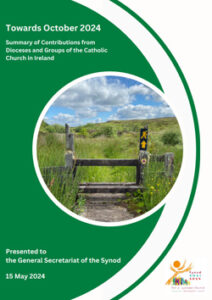Genuine synodal co-responsibility in the church will depend upon full recovery of an understanding of the importance of the sacrament of Baptism – and a canonical ‘balancing’ of the roles of clergy and lay people active in parish pastoral councils.
This is a headline conclusion of a summary of Irish feedback to the report of the first session of the universal synod on synodality, published in May 2024 in preparation for the final Vatican session of the synod in October 2024.
There is ‘A clear call for education and formation to promote a richer understanding of Baptism emerged aimed especially at young people, families, and parents,’ according to the report, entitled ‘Towards October 2024: Summary of Contributions from Dioceses and Groups of the Catholic Church in Ireland‘.
Co-Responsible PPCs demand Canon Law Reform
Critiquing the patchy performance of parish pastoral councils the report relays the view of many that ‘in reality, the PPC is an instrument of collaboration and consultation for the ordained rather than the means by which the lay faithful assume leadership’.
There is a strong perception that real differentiated co-responsibility is only going to be possible when the unique authority given to the Parish Priest in Canon Law is balanced with some definition of the authority of the faithful, in particular, structures such as the PPC.
Examining the impact of current canon law on the realisation of a synodal church, the report declares that ‘there emerges a tension as to whether co-responsibility is facilitated or impeded by Canon Law‘.
Formation Critical for Co-Responsibility
Formation is also seen as critical for co-responsibility: ‘There were calls for formation and training programmes to encompass a deep understanding of the Gospel message, the Church’s mission in the world and Catholic Social Teaching, as well as formal catechesis to equip people with the skills necessary for pastoral accompaniment, evangelisation, social justice work, and the commissioned ministries of Catechist, Acolyte, and Lector‘.
As for the thorny issue of equality of dignity for women: ‘Allied to a greater sense of co-responsibility, is an inherent right to have a greater role in how decisions are made in the Church. All who are affected by decisions should have a say in how those decisions are reached.’
Warning: Engage the Young
As for the existential issue of continuity ‘a tangible sense of anxiety was expressed in relation to the absence of young people from faith communities. With a few exceptions, the voices of young people were missing from the listening process’.
To read the full report, click here.


0 Comments